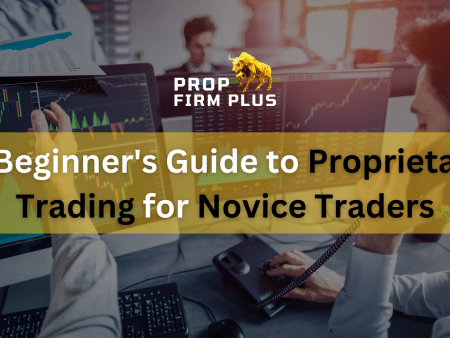
Managing International Prop Trading Markets
Proprietary trading firms have a far wider reach than the conventional financial centers we are accustomed to. They now present traders all over the world with a wide range of chances and challenges. The prospects in the trader financing sector are infinite, catering to both seasoned traders looking for funded accounts and profit split models and novice traders just getting their feet wet with their first trading accounts.
Prop trading companies have become important players in a number of areas, each with distinct trading prospects and specializations. But to successfully navigate these financial markets, one must grasp not just the economic aspects but also the local ecosystem, regulatory environment, and cultural factors.
A Comparison of the Biggest Prop Trading Firms
Although New York, London, and Hong Kong have long been considered the epicenters of prop trading, other areas of the financial markets, such as Sydney, Singapore, and Dubai, have also become important hubs in recent years. To make profitable trading as simple as possible, they provide prop traders with a special trading package that combines infrastructure, a vibrant trading community, and instructional tools.
As with any other business, these hubs have their share of benefits and drawbacks because of the wide range of financial markets they serve. While some may succeed in futures Trading others may focus on cryptocurrency, to each their own. Prop traders must assess these minute nuances in order to ascertain which option best suits their trading tactics. Time zones are becoming a more important consideration for determining the locations of significant prop trading hubs though, as seen by the increasing percentage of remote prop traders.
Prospects from the Growing Prop Trading Markets
Prop traders have the potential to grow in the prop trading marketplaces as the world becomes increasingly linked. This includes geographic prospects in the shape of emerging nations like South Africa, India, and Brazil, all of which have attracted a lot more attention from businesses looking to expand into new markets and talent pools. Numerous traders from these nations are taking part in the evaluation process, purchasing trading accounts, and joining trading communities.
Although they don’t compete with well-established centers, certain areas have special benefits. They are centers of unrealized potential, but getting around them calls for a knowledge of regional laws, customs, and possible communication difficulties.
The Global Obstacles Prop Traders Encounter
Prop traders confront several difficulties as a result of the global trading community’s constant growth, particularly when they are dispersed across multiple nations. Even seasoned traders face challenges on a regular basis, such as regulatory impediments, and language limitations.
Furthermore, risk management is essential, and in order to reduce possible losses, traders need to have strong risk management tools. It occasionally happens that novice traders in developing financial markets do not have access to learning materials.
Prop Trading Technology
The technology used on a regular basis by professional traders and prop trading organizations has changed significantly throughout the years. These days, milliseconds may make or break earnings, which is why prop traders need to have access to such technology. Modern data, sophisticated risk platforms, and high-frequency algorithms are now necessary tools in each trader’s toolbox.
Global markets, however, have varied acceptance rates for these new technologies, with some being more developed than others. Prop traders must maintain a competitive edge by being abreast of emerging trends and refining their approach.
Culture and Socioeconomic Aspects
Beyond the details, social and cultural variables greatly influence the nature of regional trading environments. How and when a trader deals can be influenced by cultural standards, commercial etiquette, and local customs. A region’s socioeconomic status affects things like a trader’s risk tolerance, trading expenses, and capital availability. Different financial products could demand different amounts of money. This implies that traders in these developing markets may not choose such instruments initially.
Practices of Risk Management
Effective prop trading requires the use of appropriate risk management techniques, and global norms are mostly unchanged in this regard. When trading methods or financial instruments diverge, those are the true differences. Certain markets may be more volatile than others, such as the futures market.
Case Studies and Triumphant Narratives
The best prop trading firms have opened up chances for hundreds of traders, who have taken advantage of them. Many have amassed sufficient savings to buy a prop firm challenge, complete the assessment, and open a funded account. They have been able to improve their family’s quality of life and investigate the financial markets. Now that they’ve acquired lucrative trading, they can support themselves with appropriate trading techniques.
Prop traders have the potential to become seasoned traders in the future, providing friends, family, and other members of the trading community with further educational tools to help them all get trader financing and participate in the financial markets.
What the Future Holds
The Prop Trading’s Future Worldwide
As prop trading gains greater traction and recognition as a reliable source of income, it will only expand globally. To be competitive, the prop trading sector must, nonetheless, constantly evolve. Blockchain, decentralized finance, and artificial intelligence (AI) have the potential to upend established paradigms and create new global possibilities and challenges.
New Possible Field Disruptors
Future developments in the political, regulatory, and economic spheres will influence prop trading. Prop firms may find it difficult to expand if a nation enacts laws that forbid prop trading or restrict a trader’s access to firms or cash. Because of this, even tenured traders need to maintain their vigilance and follow local regulations in order to be safe and make the most of the opportunities presented to them.










